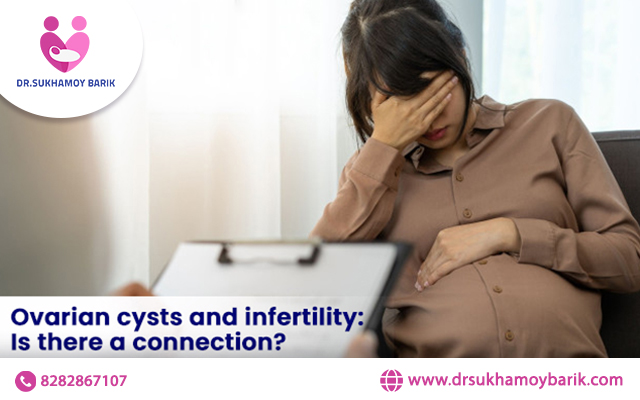Ovarian cysts have become a prevalent health concern among females nowadays. These are sacs containing fluid, often found within or on the surface of the ovary. Women are constantly worried about the impact of these cysts on their fertility. In this regard, the best gynecologist in Dum Dum, Dr Sukhamoy Barik, has explained how ovarian cysts cause infertility.
Types of cysts that affect fertility
We have discussed below some of the types of ovarian cysts that affect a woman’s fertility.
- Endometriomas – These are cystic lesions that indicate a more advanced stage of endometriosis. The latter refers to a condition when tissues similar to the endometrium grow around the ovaries and fallopian tubes. Endometriosis can significantly impact fertility. For instance, these harmful growths obstruct the fallopian tubes, alter pelvic anatomy, form adhesions, cause scarring of fallopian tubes, and affect the quality of eggs and the process of implantation.
- Polycystic Ovary Syndrome: Polycystic Ovary Syndrome (PCOS) is a hormonal disorder in women. The irregularity of hormones affects how the ovaries release eggs, posing challenges for those who are trying to conceive. According to the best infertility doctor in Dum Dum, PCOS is characterized by irregular menstrual cycles, excessive androgen-causing acne as well as hair growth, and increased testosterone levels in the blood.
Types of ovarian cysts that do not affect fertility
- Functional cysts: The most prevalent form of functional ovarian cysts include follicular cysts and corpus luteum cysts. These cysts develop as part of a regular menstrual cycle and do not induce or contribute to infertility. In reality, the presence of functional cysts serves as an indication that the essential processes leading to fertility are occurring as expected.
- Cystadenomas: These are ovarian growths originating from the surface of the ovaries. While they may necessitate treatment, it’s important to note that they do not impact fertility.
- Dermoid cysts: Solid cysts, known as dermoid cysts, comprise tissue such as skin, hair instead of fluid. Additionally, these cysts are not linked to infertility.
Diagnosis of infertility-causing ovarian cysts
Doctors may recommend the following tests to assess your gynecological health:
- Regular pelvic examinations are essential to detect ovarian changes at the earliest possible stage.
- To detect causes of menstrual irregularities or assess androgen levels, blood tests are conducted.
- Imaging tests like ultrasound help doctors examine the appearance of the ovaries and the thickness of your uterine lining.
Women are advised to take note of any unusual menstrual symptoms, particularly those persisting for more than a few cycles. Reach out to the best gynecologist in Dum Dum in case you have concerns and undergo a thorough assessment of your reproductive health.
 8282867107
8282867107 sukhamoy83@gmail.com
sukhamoy83@gmail.com
